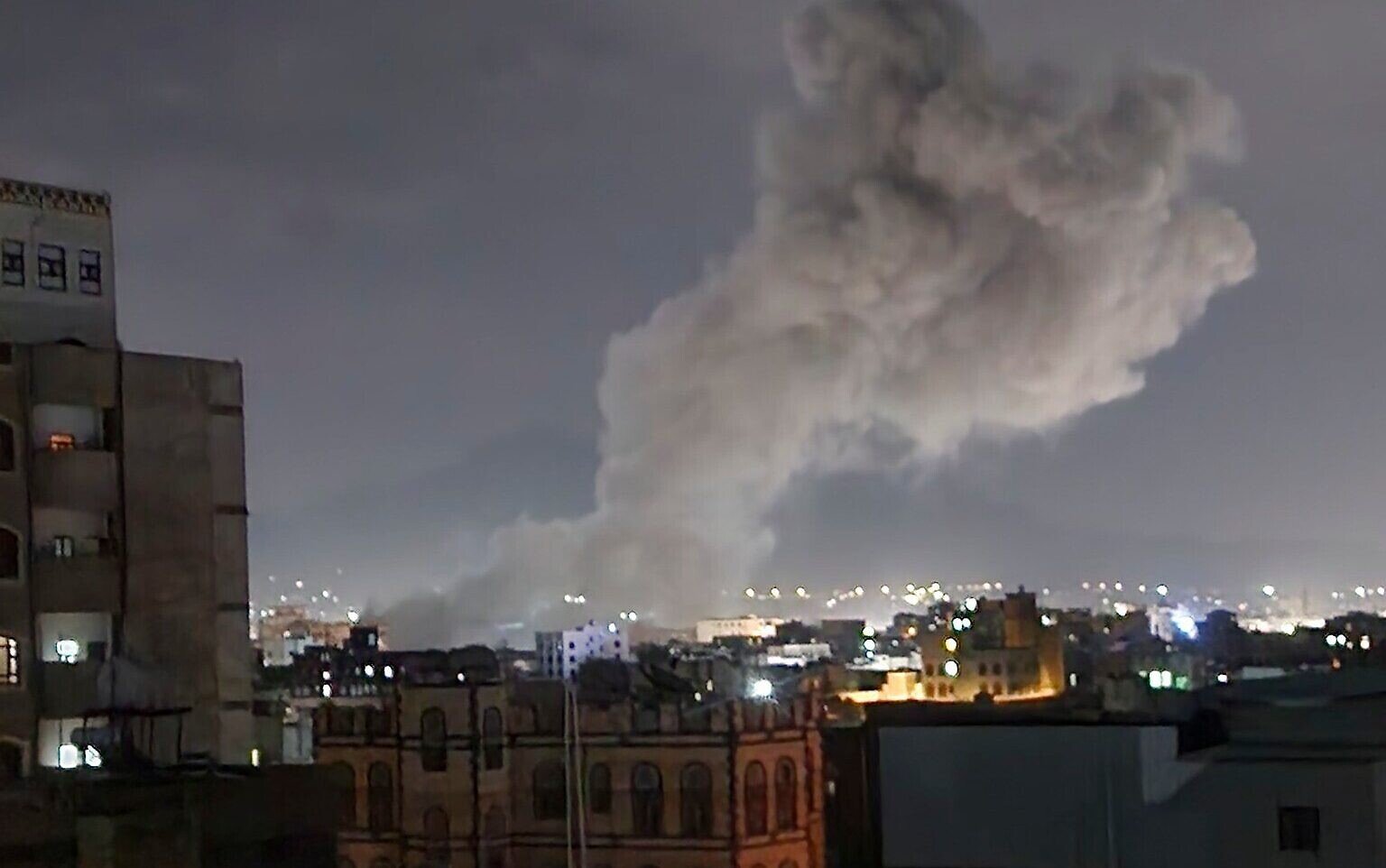Airstrikes in Yemen: America's New Quagmire in the Middle East

The Houthis are hiding in the mountains with their weapons, and U.S. airstrikes won't work.
As the U.S. launches an intense airstrike campaign against Yemen, comprising nearly 47 raids aimed at dislodging the Houthi group from its Gaza support front, experts warn that Yemen could become America's new Afghanistan.
Despite the scale of the strikes—the largest of their kind against the Houthis in years—targeting dozens of sites across six Yemeni provinces, including the capital Sana’a, and resulting in numerous casualties, experts do not foresee the Houthis' defeat.
The strikes were primarily carried out by the aircraft carrier USS Harry Truman, Tomahawk missiles launched from the U.S. Navy's Arleigh Burke-class destroyers and the submarine USS Georgia, alongside aircraft from U.S. bases in the Gulf and the Horn of Africa.
While experts have described the attacks as "painful," they are unlikely to decisively end the conflict or prevent the Houthis from targeting ships linked to “Israel” in the Red Sea, even as humanitarian aid is funneled into Gaza.
However, comments from Trump, along with his advisers and aides at the U.S. National Security Council and the Pentagon, suggest that the conflict may not be limited to airstrikes. It could escalate into a full-scale ground military operation, potentially involving regional allies, further deepening U.S. entanglement and inflaming the region.

Yemen America's Quagmire
Yemen is no ordinary country; its rugged, mountainous terrain makes it resemble an island of peaks, a feature that has long made it difficult to conquer.
This harsh, desert landscape has previously defeated the armies of several nations, including Britain, Egypt, and Saudi Arabia. Any U.S. ground intervention would likely see America mired in the same quagmire.
Britain has long sought to establish bases in Yemen due to its strategic global importance. Even after its withdrawal in 1976, the UK remained a key member of the current coalition attacking the country. Yet, as highlighted in a report by Declassified, it has failed time and again.
Egypt, under the leadership of former president Gamal Abdel Nasser, attempted to penetrate Yemen, with its costly involvement there being one of the contributing factors to the defeat in the 1967 war.
A similar fate befell the Saudis and the Arab coalition, which included the UAE, as they withdrew without success.
Between March 2015 and March 2022, the Saudi-led coalition launched between 25,054 and 75,135 airstrikes against the Houthis in Yemen, using advanced U.S. and European-made aircraft, and receiving indirect military support from the United States.
Seven years of airstrikes failed to deter the Houthis from launching counterattacks against Saudi Arabia's energy infrastructure, aviation, and other critical civilian facilities, despite the massive quantities of munitions dropped by the coalition on Yemen.
Faced with the Houthis' growing ability to intensify their attacks on the kingdom over time, Saudi Arabia was forced to sign a ceasefire in March 2022, as reported by the Atlantic Council on March 15, 2025.
Western reports attribute the continued U.S. failure in the current war to the Houthis' fortifications in the mountains, where they store their weapons. American airstrikes, even with deep-penetration bombs as used in Afghanistan, are unlikely to yield results, as Yemen shares similarities with Afghanistan.
It is the country from which the Americans ultimately fled, defeated by its mountainous terrain, making Yemen potentially America's "Arab Afghanistan."

Just as Afghanistan’s mountains in Kabul and Kandahar proved impervious to American military power, ultimately leading to a humiliating U.S. withdrawal and the abandonment of military equipment beyond the wildest dreams of the Taliban, the Houthis are expected to play a similar role.
They are defying the tripartite U.S.-British-Israeli assault, with repeated strikes on al Hudaydah and Sana’a, while the Americans hesitate to deploy on the ground, having witnessed their own debacle in Afghanistan, and the earlier failures of the Saudis and Emiratis in Yemen.
Western experts draw comparisons between Yemen and Afghanistan in terms of armament and military superiority, asserting that the Houthis are more formidable than the Taliban, equipped with more advanced and powerful weaponry.
This capability has allowed them to repeatedly target U.S. warships and aircraft carriers, forcing them to retreat from the Red Sea.
On March 5, 2025, the Houthis downed a U.S. MQ-9 Reaper drone during a reconnaissance mission over the Yemeni city of Hodeidah.
Prior to this incident, they had attempted to target the U.S. F-16 fighter jet with a surface-to-air missile, showcasing their growing combat prowess.
Former U.S. President Donald Trump acknowledged that the Houthis blocked the passage of any U.S. or Israeli ships through the Bab el-Mandeb Strait for 15 months during the Gaza war.
As a result, the number of vessels crossing the Red Sea dropped from 25,000 annually to around 10,000.
On March 15, 2025, the White House and a Pentagon spokesperson confirmed that “the Houthis have attacked U.S. warships 174 times and commercial vessels 145 times since 2023.”
However, military assessments indicate that these strikes are unlikely to halt the blockade.
“The Houthis have targeted over 100 merchant vessels with missiles and drones, sinking two vessels and killing four sailors during their campaign targeting military and civilian ships between the start of Israel’s war in Gaza in late 2023 and January of this year, when the current ceasefire took effect,” according to NBC news.
Despite previous airstrikes from the U.S., “Israel,” and Saudi Arabia, the Houthis have remained undeterred.
Each time Israeli officials issued threats or launched air raids, the Houthis responded by firing more missiles, demonstrating that these attacks had little impact on their resolve.
Following the U.S. airstrikes, the Houthis officially declared that the bombardments would not deter them and that they would retaliate against America.
"Sanaa will remain Gaza's shield and support and will not abandon it no matter the challenges," according to The Times of Israel.
The Houthis have entrenched themselves in Yemen's mountainous highlands, successfully seizing the capital and gaining control of the country. They have received unprecedented support from Iran and China in missile and tunnel construction, along with the development of a missile and drone program capable of striking “Israel” with a range of up to 2,000 kilometers.
These capabilities are difficult to neutralize through airstrikes, and securing a long-term victory over them, as in Afghanistan, seems unlikely, despite Trump’s threats to unleash "overwhelming lethal force" this time.
Yemen's Unyielding Resistance
U.S. researchers acknowledge that Yemen could prove even more challenging for America than Afghanistan.
Dr. Charles Schmitz, a professor of geography and political economy at Towson University in Baltimore, Maryland, predicts that Yemen may become America's graveyard.
In a recent interview, he stated that Yemen is not even comparable to Afghanistan; it could be worse for America than Vietnam.
“Yemen is like Afghanistan- the graveyard of empires!” pointing out that the Houthis are “sophisticated people” and “sharp,” adding “Sometimes they are painted as a ragtag army, they are no ragtag army at all.”
This view was also echoed by former Tunisian Foreign Minister Rafik Abdessalem, who asserted that anyone seeking to fight in Yemen would be reliving the exact same experience as Afghanistan—essentially repeating past mistakes.
"This is a surefire recipe for failure," he wrote on his X account.
He attributed this to Yemen's rugged terrain, which overwhelms any invading force with its complex mountains, valleys, caves, and sand dunes.
He explained that even if reliance is placed on airpower, as the U.S. is currently doing, they will "simply bomb what has already been bombed and destroyed, or they will be forced to empty their ammunition and smart and dumb weapons into empty mountains, valleys, and barren highlands—nothing more."
He predicted that if attacks on Yemen by aircraft and missiles continue, Yemenis would forget their internal conflicts and grievances, uniting against those targeting them with invasion or bombardment.
However, he warned that the first to pay the price would be the "regional countries involved in the aggression against them," once the U.S. eventually departs from the region, whether sooner or later.
Argentine journalist Tadeo Castiglione remarked that no one has ever been able to control Afghanistan, and that Yemen, with over 4,000 years of civilization, will not be easily subdued by anyone.
He described Afghanistan as "merely a pea in comparison to Yemen," and called Trump "as mad as a hare," asserting that the U.S. president failed to grasp the mistake he had just made by launching an attack on Yemen.
U.S. journalist Ryan Grim criticized the U.S. bombing of Yemen on behalf of “Israel”.
"U.S. is bombing Yemen because that’s easier to do than to get Israel to abide by the terms of a ceasefire they already agreed to," Grim wrote on X.
Houthi Resilience
A report from the Atlantic Council on March 15, 2025, quotes experts stating, "Given the Houthis' long history of resistance—first against the central Yemeni government they overthrew, and then against the Saudi-led coalition—it is unlikely that the current round of airstrikes will deter them."
The experts also emphasized that, given the Houthis receive support not only from Iran but also from supply networks in China and Russia, the U.S. will need to deploy greater resources than the airstrikes carried out on March 15. This, they argue, explains America's ongoing engagement with Russia and its threats towards Iran.
The report also cited Thomas S. Warrick, a researcher at the Scowcroft Middle East Security Initiative and former Deputy Assistant Secretary for Counterterrorism Policy at the U.S. Department of Homeland Security, who predicted that Trump's strikes would not succeed in deterring the Houthis.
"The Trump administration has now decided to escalate the attacks to see if a more painful show of force will stop them," he said.

Emily Milliken, Assistant Director for Media and Communications at the N7 Initiative for Middle East Programs at the Atlantic Council, stated that strikes against Houthi bases, leaders, and missile defenses could impact their operational capacity in the short term.
"The Houthis have proven resilient in the past and were still able to pose a regional threat after successive strikes by the Saudi-led coalition and allied forces. The retaliation could be a message to Yemenis living under their control, their backers in Tehran, and the wider international community that they remain undeterred by U.S. operations," she said.
Looking ahead, she explained, it is likely the group will launch a retaliatory strike, possibly targeting the U.S. aircraft carrier USS Truman in the Red Sea or American bases in the region, to demonstrate that they remain a powerful force.
Both Americans and Arabs expressed astonishment at Trump’s attacks, noting that the previous U.S. administration under Joe Biden, which Trump had criticized, was well aware that any military action against Sana’a would not achieve either the goal of toppling the city or enabling Israeli ships to pass freely.
The notion of halting Yemen’s support for Gaza, they argued, is impossible, and any pressure or threats aimed at Sana’a through airstrikes are also doomed to fail.
So why, then, did Trump choose to pursue this course? Critics described his actions and decisions as foolish and reckless.
They emphasized that the only outcome of these military operations, especially if they target civilian sites, will be to unite the Yemeni people in resistance against the aggression, strengthen Sana’a's position, and drive citizens to overlook past failures, even increasing national cohesion around the government.
"With this move, Trump has dragged America into a quagmire where the war in Afghanistan may seem like a mere stroll, if only due to the geography," Azal Aljawi noted.
The United States, in collaboration with the United Kingdom, has been working to counter Houthi attacks on ships in the Red Sea since January 12, 2024. Prior to Trump’s strike, they had carried out 73 airstrikes on Yemen, with the mutual exchanges of attacks continuing until the ceasefire in Gaza.












